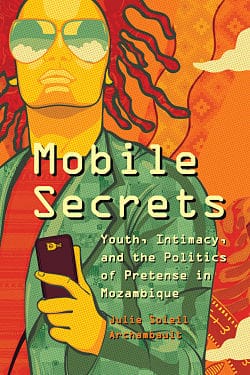Information and communications technology (ICT) has been hailed as the holy grail of “transformational development”, the source of growing innovations (such as the sending of remittances through mobile phones) and an expanding market for the Africa Rising narrative. Scholars and activists are also increasingly interested in how social media and platforms such as WhatsApp can be used as catalysts for social change, by social movements and in democratic processes. What is unique and refreshing about Julie Archambault’s Mobile Secrets: Youth, Intimacy and the Politics of Pretence in Mozambique is its very different exploration of the role of mobile phones in processes of social transformation, looking at how new forms of communication become tools in young Mozambicans’ efforts to make life meaningful, create relationships and forge a future in the midst of uncertainty. These questions strike to the core of debates about morality, sociality and the shape of the future for young people across the continent. This way, mobile phones offer an entry point into much more important questions, offering a novel insight into themes that have long been the concern of anthropologists.
Through a vibrant and engaging ethnography, Archambault lets us into the lives of her interlocutors in the M ozambican suburb of Liberdade, showing us how the mobile phone has opened up “virtual spaces of intimacy in which new, and not-so-new ways of being and relating can be tried out and negotiated” (p.22). Through confident and reflexive prose, she narrates at times humorous at times challenging stories about love, relationships and struggles for achieving social status. Pretence, facades and “wilful blindness” are central to these struggles as young men and women in Liberdade “cruise” through uncertainty.
ozambican suburb of Liberdade, showing us how the mobile phone has opened up “virtual spaces of intimacy in which new, and not-so-new ways of being and relating can be tried out and negotiated” (p.22). Through confident and reflexive prose, she narrates at times humorous at times challenging stories about love, relationships and struggles for achieving social status. Pretence, facades and “wilful blindness” are central to these struggles as young men and women in Liberdade “cruise” through uncertainty.
The mobile phone, the book shows, is a fundamental tool in efforts to balance the need to display social status and to conceal other aspects of life, or the negotiation of multiple identities and relationships.
These tensions are poignantly summarised by Ignacio, one of the young men from Liberdade who tells Archambault: “You know, many people who own fancy phones sleep on the floor, but if houses were made of glass, these people would have gotten beds long ago”. Yet, Mobile Secrets does not allow us to see its protagonists as victims of a complex post-war political economy. Indeed, the book’s most profound insights come from reflections on the mobile phone, in mediating the tensions between secrecy and display, serve a fundamental function in young people’s projects of self-making.
The re-centring of agency in the study of youth has been a key component of scholarship on youth in recent years, most notably through Henrik Vigh’s (2006) work on young men “navigating” complex terrains in Guinea Bissau or as exemplified in the collection Navigating Youth, Generating Adulthood (Christiansen, Utas and Vigh, 2006). Similarly, scholars are increasingly sensitive to the ways in which uncertainty and crisis can be productive and not simply constraining (e.g. Cooper and Pratten, 2015). Mobile Secrets adds an important dimension to these discussions by revealing the ways in which young people “cruise through uncertainty” by telling their own stories about their lives, by carefully, and selectively, curating their image and, consequently, their social position and relations to others. As Michael Jackson’s work on existential anthropology and the politics of storytelling has taught us, telling stories about oneself and gaining a sense of self through our interaction with others is central to what it means to be human. Stories “enable us to regain some purchase over the events that confound us, humble us, and leave us helpless, salvaging a sense that we have some say in the way our lives unfold” (Jackson, 2002, p. 17).
These projects of self-making amongst Liberdade youth are well encapsulated by the concept of visão which is not simply the ability to “see and read the landscape” but also knowing how to “project a certain image, how to play with the visions of others” (p.19). Visão is therefore the ability to keep an eye on the present while moving towards the future, but it is also the ability to decide what others see and what they don’t see as well. Ironically, it is also about not seeing, in the sense of knowing when to feign ignorance so as to keep social relations intact. Mobile phones, both as status symbol and as mediums of discreet communication are instrumental in young people’s efforts to shape their lives against the odds. Occasionally the reader is left wondering whether mobiles are granted too much importance in the description of practices that are not premised on the existence of this technology. Yet, mobiles do serve an important symbolic role as the way they are used by young Mozambicans express the productivity as well as the production of uncertainty.
This manifests itself in the ways that new technologies offer possibilities for surviving the present as well as for trying to reach higher levels in the future. Young people in Liberdade for example generate new economic opportunities (not all legal) through the creative use of the mobile phone. Mobile phones are also increasingly central in negotiations over redistribution and dependency, and, are therefore important in the making and mediating of social relations. This is most evident in the way mobile phones have entered the management of romantic and sexual relationships. Young people flirt through the mobile phone; illicit relationships are concealed (not always successfully) through secret messages, as the phone becomes a key source of jealousy. Chular—the “taking advantage of someone under sexual pretences”– is also facilitated by the phone, though Archambault avoids what are often facile analyses of such relationships as transactional, allowing for a complex combination of affect and opportunism. Whilst in the West we are increasingly concerned about the role of technology in process of atomisation and alienation, Archambault shows that the practices of concealment and “wilful blindness” that mobiles facilitate in Liberdade in fact are what make intimacy and trust possible.
In all these domains, Mobile Secrets shows how young people use mobiles to gain a “degree of authorship and control over their lives”. Whilst the book’s stories make clear that this is a project that requires concealment, curated display and a careful management of personal relations, conceiving of this only as a form of “pretence” risks foreclosing the possibility that such projects of self-making are oriented towards imagining a future, aspirational self rather than simply covering up less flattering realities. As the book reminds us, certainty can be a “hope killer” (152). The point then, is not about dishonesty but imagination, and the ability to imagine is a central part of living, rather than simply surviving, to put it in the terms of the protagonists of Mobile Secrets. This raises, as Archambault acknowledges, also a challenging question for research as an enterprise of discovery aimed at analytical clarity. “What happens to the anthropological project of disclosure in a social world embroiled in the politics of pretence?”—she asks in Chapter 6 on “Truth and Wilful Blindness”. I would also add: what is our responsibility as ethnographers in terms of taking seriously the stories our interlocutors want to tell about themselves and to embrace the contradictions that this entails? As new technologies open avenues for young people to imagine themselves and their future, they also create new opportunities to interrogate our ethnographic gaze.
Photo (cropped) by ethekwinigirl (flickr.com, CC BY-NC 2.0)



